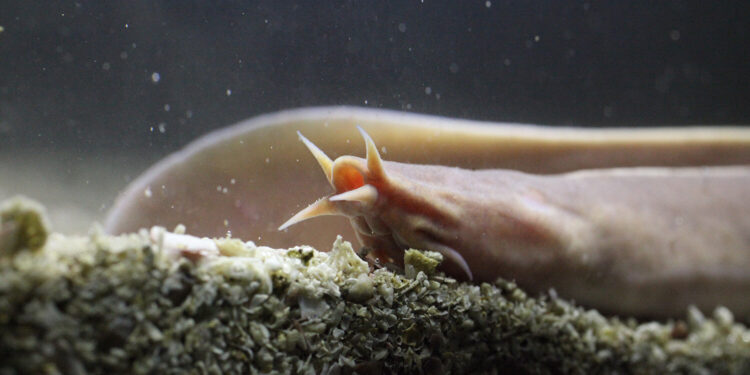Credit: University of Malaga
An international scientific team made up of more than 40 authors from seven different countries, led by a researcher from the University of Malaga Juan Pascual Anaya, has succeeded in sequencing the first genome of the hagfish, also known as hagfish, the only large group of vertebrates for which there is not yet a reference genome for any of its species.
This discovery, published in the journal Ecology and evolution of naturehas helped decipher the evolutionary history of genome duplications that occurred in the ancestors of vertebrates, a group that includes humans.
“This study has important implications in the evolutionary and molecular field, because it helps us understand the changes in the genome that accompanied the origin of vertebrates and their most unique structures, such as the complex brain, jaw and limbs. “, explains the study. scientist from the Department of Animal Biology at UMA Pascual Anaya, who coordinated the research.
Thus, this study, which lasted almost a decade, was carried out by an international consortium that includes more than 30 institutions from Spain, the United Kingdom, Japan, China, Italy, Norway and United States, including the University of Tokyo, Japan’s RIKEN research institute, the Chinese Academy of Sciences and the Barcelona Genomic Regulation Center, among others.
Ecological link
Myxini are a group of animals that inhabit deep ocean areas. Known for the quantity of mucous membrane they release when they feel threatened, an object of research by cosmetic companies, but also for their role as an ecological link in the seabed (since they are scavengers and are responsible for eliminating, between others, corpses). whales that end up at the bottom of the sea after their death), until now their genome had not been sequenced due to its complexity.
They are composed of a large number of microchromosomes, themselves composed of repetitive sequences. Added to this is the difficulty of accessing biological material.
“In addition, these microchromosomes are lost during the development of the animal, so that only the genitals retain an entire genome,” explains Juan Pascual Anaya.
Credit: University of Malaga
Genome duplications
For this study, the genome sequenced was that of Eptatretus burgeri, which lives in the Pacific, on the coasts of East Asia. To achieve this, researchers generated data up to 400 times the size of its genome, using advanced chromosome proximity (Hi-C) techniques and managing to assemble them at the chromosome level.
“This is important because it allowed us to compare, for example, the order of genes between this and the rest of vertebrates, including sharks and humans, and thus resolve one of the most open debates important aspects of genomic evolution: the number of genome duplications, and when these occurred during the origin of the different lineages of vertebrates”, explains the UMA scientist, who adds that thanks to this, we now know that the common ancestor of all vertebrates came from a species whose genome was completely duplicated once.
Later, according to Pascual Anaya, the lineages that gave rise to modern mandibular and non-mandibular vertebrates separated, and each of them remultiplied its genome independently: while the first, which includes man, ‘duplicated it, the second tripled it.
Credit: University of Malaga
Evolutionary impact
An analysis of genome functionality, based on extremely rare samples of myxini embryos, carried out in the laboratory of Professor Shigeru Kuratani at RIKEN; and a study on the possible impact of genome duplications on each vertebrate, developed in collaboration with University of Bristol professor and Royal Society member Phil Donoghue, complement this multidisciplinary research essential to understanding evolutionary history vertebrates.
The study provides insights into the genomic events that likely led to the appearance of important features in vertebrates, such as brain structure, sensory organs or neural crest cells, and among them, an increase in regulatory complexity (a greater number of switches that turn genes on/off).
More information:
The hagfish genome elucidates vertebrate whole-genome duplication events and their evolutionary consequences. Ecology and evolution of nature (2024). DOI: 10.1038/s41559-023-02299-z
Provided by the University of Malaga
Quote: Researchers sequence the first genome of myxini, the only vertebrate lineage that did not have a reference genome (January 12, 2024) retrieved on January 12, 2024 from
This document is subject to copyright. Except for fair use for private study or research purposes, no part may be reproduced without written permission. The content is provided for information only.



